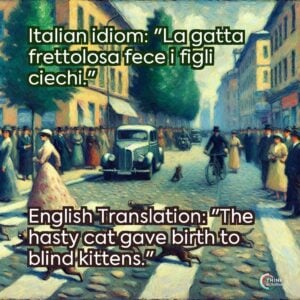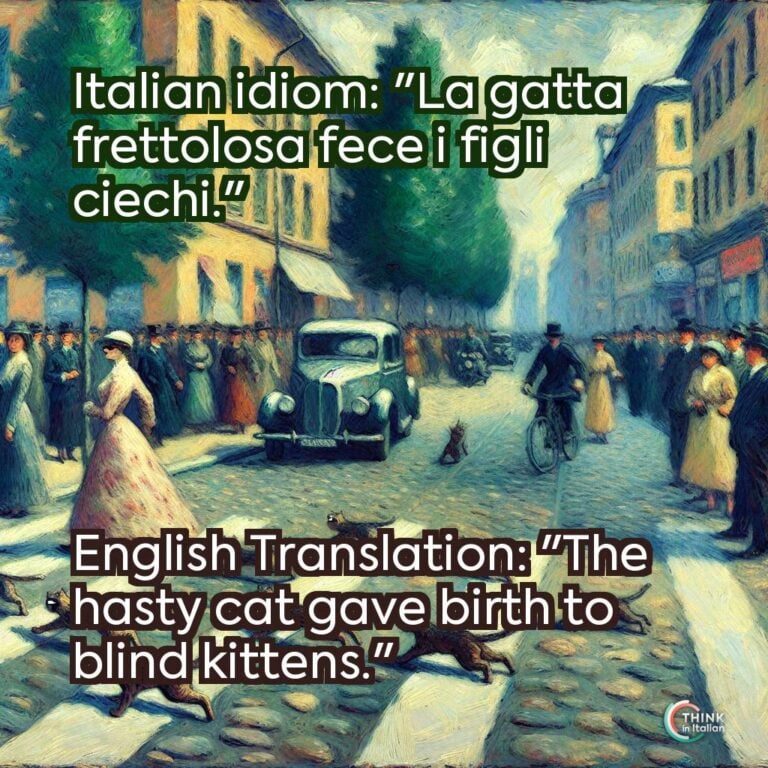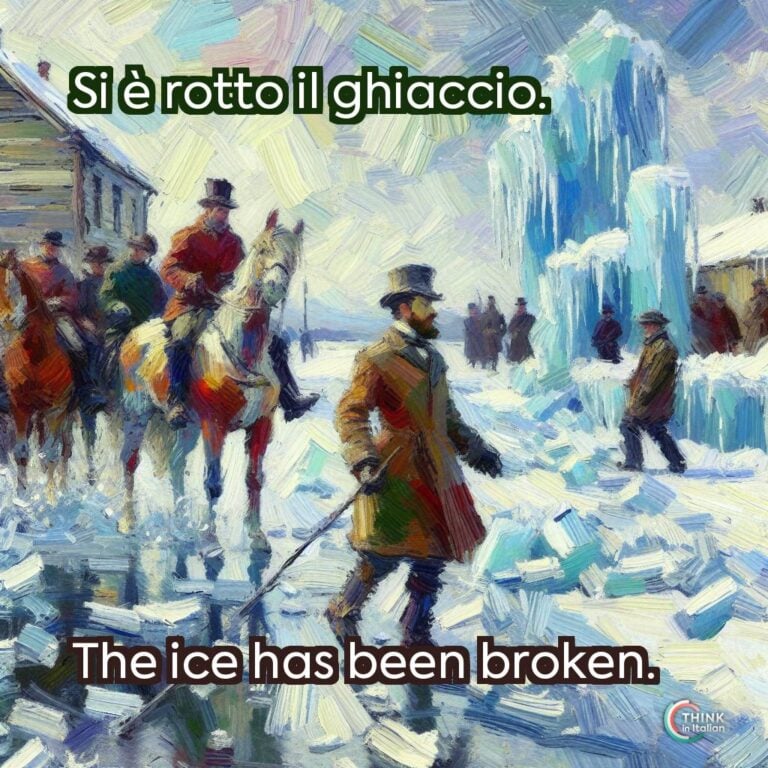Download 15 Beautiful Images of Italian Inspirational Quotes
Share your feelings with your loved ones with Italian quotes!
I collected 5 Italian inspirational quotes in 3 formats (desktop, mobile, social) for you to share with friends or set as your desktop or mobile background images.
Where should I send them?
Receive a quote a day over the next 5 days plus a wealth of free useful resources. Opt out at any time.
Just submit this form to receive the images in your mailbox.
Idioms are expressions whose meanings transcend the literal interpretation of their individual words. They are integral parts of every language, and serve to make a shortcut in presenting a complex idea or emotion in a culturally flavored way.
They are deeply engraved in the social life of those who use them, which shows tradition, values, and historical contexts of the place of origin.
For example, the Italian expression Marco è buono come il pane (Mark is as good as bread) brings in a great deal about Italy’s priority in living, where bread is considered a staple in life that represents nourishment, kindness, and sharing.
This is the linguistic aspect of idioms that I find fascinating, as they encapsulate cultural identity. They represent, semantically speaking, the magic of linguistic evolution.
They highly depend on metaphorical or symbolic relations, requiring shared cultural understanding with respect to their meanings. For this very reason, they pose problems for non-native speakers who are used to grasping words’ literal meanings.
If you’re learning Italian, you might be unable to immediately grasp their non-literal meanings. Yet, it is just this interpretive complexity that makes idioms such a vibrant and dynamic part of language.
However, my advice is that you do not avoid learning them, as they are a crucial part of every language: they enliven conversations, adding color and character while fostering a sense of shared identity among speakers.
They are creative linguistic artifacts, offering a glimpse into the imagination, humor, and historical realities of the communities that created them.
Italian Idioms
Italian Idioms About Food
Food is the beating heart of Italian culture, embodying family, tradition, and a zest for life. It’s no wonder that food-themed idioms dominate the language, offering wisdom, humor, and life lessons tied to the culinary traditions of Italy.
Essere buono come il pane.
To be good as bread.
Bread, a staple of Italian life, symbolizes goodness and generosity. This idiom describes someone with a kind heart.
Tutto fa brodo.
Everything makes broth.
Reflecting Italian resourcefulness, this idiom suggests that every contribution, no matter how small, adds value.
È tutto pepe!
He/She is all pepper!
A vibrant metaphor for someone full of energy and zest for life.
La minestra riscaldata.
Reheated soup.
A poignant idiom describing an attempt to revive a failed relationship or situation, destined to lose its original charm.
Diciamo pane al pane e vino al vino.
Let’s call a spade a spade.
It encourages directness and honesty, much like Italians’ straightforward communication style.
Avere le mani in pasta.
To have hands in the dough.
It signifies being deeply involved in something, often with a hint of control or expertise.
Non tutte le ciambelle riescono col buco.
Not all doughnuts come out with a hole.
A charming reminder that perfection isn’t guaranteed.
Italian Idioms About Animals
Animals are intrinsic to Italian idioms, symbolizing human traits and conveying cultural values with wit and charm.
In bocca al lupo.
Into the wolf’s mouth.
A famous idiom used to wish good luck in Italian, especially before a challenge. The typical response to that is Crepi il lupo! (May the wolf die!)
Essere un pesce fuor d’acqua.
To be a fish out of water.
Perfectly captures the awkwardness of feeling out of place.
Conosco i miei polli.
I know my chickens.
Indicates familiarity with people or situations, often implying confidence in judgment.
Il lupo perde il pelo ma non il vizio.
The wolf loses its fur but not its vice.
Highlights how intrinsic traits rarely change.
A caval donato non si guarda in bocca.
Don’t look a gift horse in the mouth.
It advocates gratitude over criticism.
Italian Idioms About Life and Wisdom
Italian idioms about life embody a wealth of cultural wisdom, often offering a humorous perspective on universal truths.
Chi dorme non piglia pesci.
Those who sleep don’t catch fish.
It encourages proactivity and seizing opportunities.
Ogni morte di papa.
Once in a blue moon.
Highlights the rarity of an event, tying it to the infrequent passing of a pope.
Chi va piano, va sano e va lontano.
Who goes slowly, goes safely and goes far.
Finché c’è vita, c’è speranza.
Where there’s life, there’s hope.
Italian Idioms About Love and Relationships
Italy, synonymous with romance, boasts idioms that beautifully capture the nuances of love and human connection.
Morto un Papa se ne fa un altro.
Once a Pope is dead, another one comes.
This highlights that everyone can move on, also after big losses.
Chiodo scaccia chiodo.
A nail drives out another nail.
This refers to getting over heartbreak with new love.
Italian Idioms About Colors
Colors in Italian idioms reflect emotions, states of mind, and even practical circumstances. These expressions highlight the symbolic power of colors in Italian culture and language.
Essere al verde.
To be broke.
It indicates financial struggles, with “green” referring to the color historically associated with the bottom of a wallet.
Vederci rosso.
To see red.
This conveys extreme anger or frustration.
Sogni d’oro.
Golden dreams.
A beautiful way to wish someone sweet dreams.
Mettere nero su bianco.
To put it in black and white.
It refers to writing something down or formalizing an agreement.
Italian Idioms About Weather
Talking about the weather in Italian reflects Italy’s agrarian roots and its people’s close connection to nature. They also serve as metaphors for human experiences.
Non ci piove!
No doubt about it!
It conveys certainty, much like a sunny day without rain.
Piove sul bagnato.
When it rains, it pours.
This suggests that misfortunes often compound, much like rain falling on already wet ground.
Italian Idioms About Work and Responsibility
Work is an integral part of life, and these idioms reflect Italy’s pragmatic and occasionally humorous approach to effort and accountability.
Hai voluto la bicicletta? Allora, pedala!
You wanted the bike? Now, pedal!
It encourages people to take responsibility for their choices.
Andare liscio.
To go smoothly.
Describes something proceeding without complications.
Rimboccarsi le maniche.
To roll up one’s sleeves.
It is meant to convey that someone is getting to work, implying effort and readiness to tackle a challenge.
Avere la testa sulle spalle.
To have your head on your shoulders.
It means to be responsible and sensible in handling tasks or decisions.
Portare acqua al proprio mulino.
To carry water to one’s own mill.
Meaning to work in a way that benefits oneself, sometimes selfishly.
Sudare sette camicie.
To sweat seven shirts.
It means to work very hard to achieve something, emphasizing the physical or mental effort involved.
Italian Idioms About Conflict and Resolution
Conflict is a natural part of life, and Italians express their approach to disputes and resolutions through colorful idioms.
O la va o la spacca.
Do or die.
It captures the essence of taking a bold risk, knowing it could either succeed or fail dramatically.
Pareggiare i conti.
To settle the score.
It is used to seek revenge or ensure fairness by addressing a previous wrong.
Gettare acqua sul fuoco.
To throw water on the fire.
Conveying the need to extinguish a fire by throwing water on it, to calm a tense situation or resolve a conflict peacefully.
Lavare i panni sporchi in famiglia.
To wash dirty laundry in the family.
Meaning that conflicts or problems must be solved privately rather than publicly.
Tirare fuori gli scheletri dall’armadio.
To pull skeletons out of the closet.
It means to reveal hidden conflicts or secrets, often causing tension.
Why Learn Italian Idioms?
Mastering idioms is a cornerstone for anyone seeking fluency in Italian. They are expressions that bridge the gap between the textbook language and the dynamic, living speech of native speakers.
By using idioms, you will sound much more natural right away. They give your speech a rhythm and cadence, as if you were a native speaker.
Besides adding fluency, an idiom is a shortcut to express an idea in a precise and quick way. For example, instead of detailing how uncomfortable you are because you feel out of place, you could simply say mi sento un pesce fuor d’acqua (I feel like a fish out of water).
Not only will this efficiency make your communication sharper, but it will also deepen your involvement with Italian culture. You’ll get closer to Italy’s humor, traditions, and values and offer a peculiar window onto the mindset and history of the people.
Also, mastery of idioms provides easy access to native materials, movies, songs, and literature, enhancing your cultural exposure to it. They’re much more than just words, though-they’re keys for enjoyment and mastery of Italy’s vibrant way of life.
Dive Into Italian Idioms
Italian idioms cover a wide array of topics, from food to life’s wisdom, and they often reflect the values and humor of Italian culture.
They are a fascinating way to understand a language. They go beyond mere words, providing insights into history and traditions.
Italian idioms add vibrancy to conversations and deepen your connection to the culture, and also appear frequently in modern media, literature, and music, offering a way for learners to connect deeply with the language.
Mastering Italian idioms is not just about learning a language; it’s about experiencing Italy’s culture and connecting with its people.
Whether you’re just starting or are an advanced learner, incorporating idioms into your conversations will make your Italian more vibrant and authentic.







